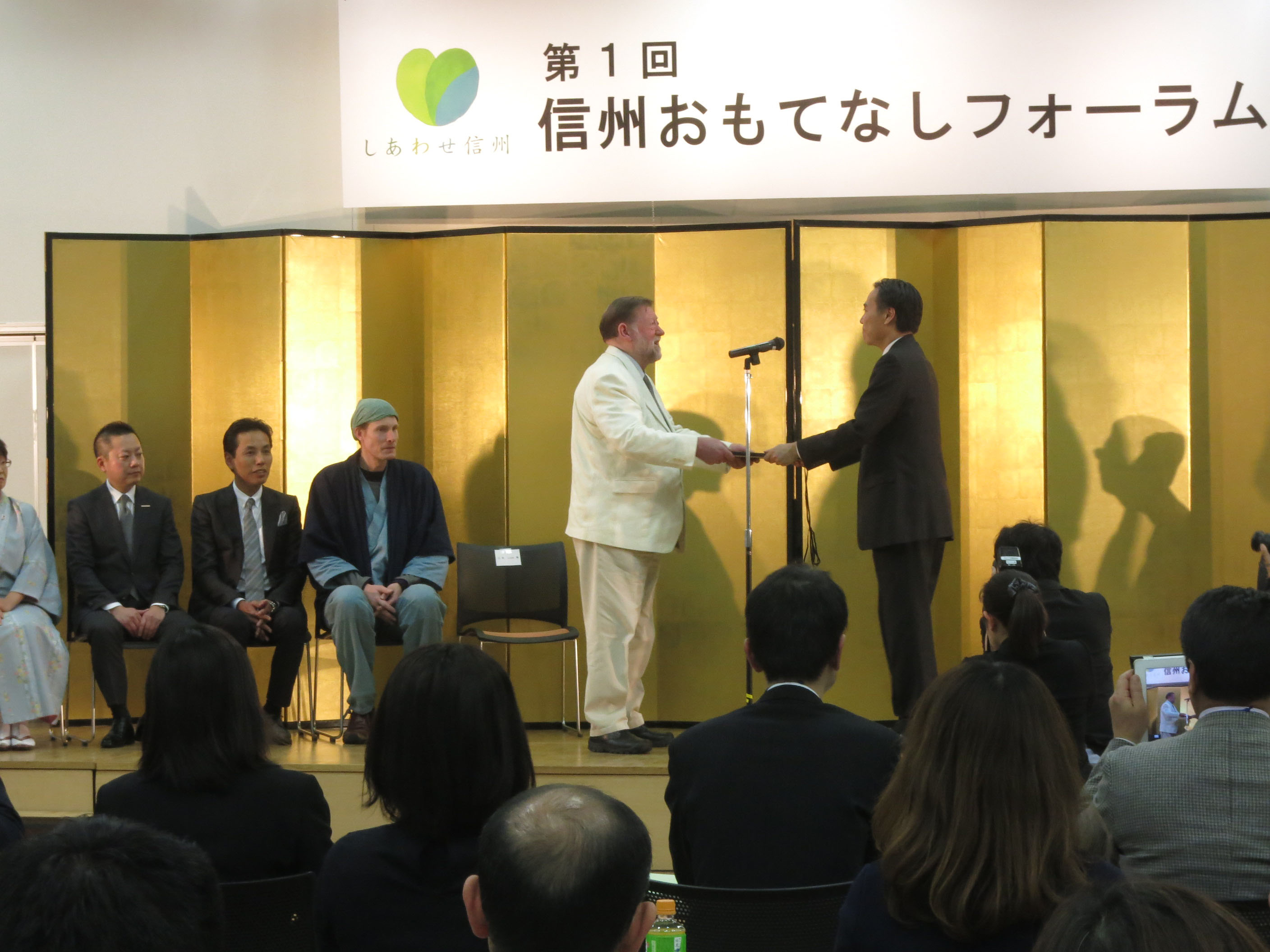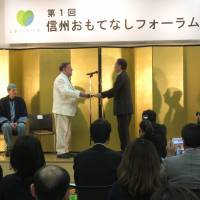As the Tokyo 2020 Bid Committee's appointed "Cool Tokyo" ambassador, multilingual television journalist Christel Takigawa set media buzzing worldwide with her Sept. 7, 2013, speech to the International Olympic Committee in Buenos Aires in which she made great play of the word "motenashi" by attaching the honorific prefix "o" and enunciating it slowly as "o-mo-te-na-shi."
A dictionary will tell you omotenashi means "hospitality, treatment, reception, service," but among the praise her use of the word prompted on social media, some expats poured scorn and sounded off about hospitality not being unique to Japan, and most of it being strictly by the book anyway.
For sure, hospitality isn't unique to any culture or people; and, yes, most hotels, shops and such in Japan get their staff to follow manuals on service and etiquette.
Regardless of me truly liking and respecting Christel, who has visited me here where I live outside Kurohime in the Nagano Prefecture hills — and the fact she's charming and a lot of fun to be around — I do tend to agree there's a rather unique tradition in Japan about the way guests are treated.
Maybe it has become superficial, the bowing of the cleaners who rush to prepare shinkansen cars before the next passengers board, and that kind of stuff. Nonetheless, I don't know any other country where politeness and good manners are the norm. It is certainly no longer so in Wales, where I was born.
I first came to Japan in 1962, and as big cities make me feel hemmed in and uncomfortable, I spent as much time as I could in the countryside, hiking in the mountains, visiting small fishing villages and so on. That was only 17 years after World War II ended, and I was a young native of what had been an enemy nation who spoke hardly any Japanese. Yet, especially in the countryside, I was welcomed everywhere with kindness and good humor.
Back then I'd just completed an 18-month Arctic expedition during which our diet was very, very limited (!), so I immediately loved Japanese food. Oddly, though, my hosts would generally say they were serving me "kyo wa nanimo nai" — and I knew that "kyo" meant "today."
As their fine fare might be wild mountain vegetables, local fish (other than pricey tuna or sea bream), mushrooms, miso soup with local vegetables and hare, wonderful pickles of all sorts, loach and tofu, even fresh oysters — in fact all manner of things depending on the season and region — I figured out that "nanimo nai" described today's "kind of cookery."
In fact, "nanimo nai" means "nothing," and it was a couple of years before I learned that "kyo wa nanimo nai" actually means, "We don't have anything special to please you" — implying they hadn't anticipated my coming and only had local food to offer.
As I grew older I realized that my hosts or their relatives, friends or neighbors had put a lot of care and effort into gathering the food being prepared for me — and they were actually proud of it but unsure whether it would suit the tastes of an outsider, especially a foreigner.
It suited me just fine, though, and I now consider "nanimo nai" ("this is all we have") to be the basis of hospitality.
Among many kinds of hospitality I've enjoyed all over the world, the most memorable has been with people who appear to have very little — hunting Inuit in the Arctic, Ituri Rainforest pygmies in today's Democratic Republic of Congo (formerly Zaire), Simien Mountain farmers in Ethiopia, and foresters and reindeer herders in the Kamchatka region of Russia's Far East. All those folk have to do their utmost to feed, clothe and house their families, and all of them prefer peace to conflict. And none of them have fancy restaurants or expensive hotels in which to entertain guests.
Canadian Inuit, especially, showed me that the essence of hospitality is sharing. Sharing was the core of survival. When sharing breaks down, culture is stressed and fractured. This may be idealistic, but what's wrong with being idealistic?
However, to return to the subject of omotenashi, on Feb. 14 in Nagano City, two people were awarded the status of omotenashi taisho (ambassador of hospitality) by Nagano Gov. Shuichi Abe. One was me, a Welsh-born Japanese citizen; the other was Tyler Lynch, a 2-meter American who runs his wife's family's hot-spring inn, Kamesei Ryokan, in Shinshu Kokura Kamiyamada Onsen.
It's easy to understand why Tyler received the award, as he is deeply involved in the traditional hospitality industry and is very active in efforts to improve the local environment and develop international relationships. But why me? I don't run an inn, or a hotel — or even a modest pension.
Well, since Kurohime became my home in 1980, I've made well over 100 TV programs and have given many more interviews and delivered countless lectures. In fact, I've likely brought many hundreds — if not thousands — of people from all walks of life and all parts of the world to visit our area, and most will have stayed at least one night at local facilities.
In addition, our Afan Woodland Trust Centre has for the past 12 years hosted children with visual difficulties or other disabilities, or who have been traumatized or abused, for two or three days at a time, encouraging them to play and discover in the woods, streams and — often enough — snow.
For the past 3½ years we have also been helping to establish a forest school in Higashi Matsushima, a community on the Miyagi Prefecture coast that was terribly damaged by the Great East Japan Earthquake and tsunami on March 11, 2011, and also inviting adults and children from there to Kurohime.
Hence, though the prefectural award is not an honor I sought, I was pleased to accept it on behalf of my family and staff, and all the experts and friends who have supported and still support these projects.
On Feb. 28, we have invited 30 children, half from Higashi Matsushima, half from a local school, to have fun and enjoy some adventures in the snow (with a few snow-country survival tips thrown in) followed by a dinner in the big hall of our Afan Woodland Trust Centre.
What with carers and instructors, that means I will have personally cooked for 50 people by the time you read this — and the main "kyo wa nanimo nai" dish will be a venison curry, cooked with local chestnuts and mushrooms, potatoes, carrots, onions and celery.
Probably none of the children and only a few of the adults will have eaten venison before. This is such a pity and a waste considering that last year in this prefecture alone, more than 30,000 deer were killed — with less than 5 percent of the meat consumed and none of the hides used.
Which brings me to a better-know Japanese word — mottainai, meaning "irreverent waste."
When I'm served U.S. or Australian beef at a friend's house, I gladly tuck in. However, as far as I can without causing offence, I will refuse that popular, marbled, revoltingly fatty Japanese wagyu beef — not because it's expensive (I'd never pay for the stuff), but because it is unhealthy and, as far as I am concerned, the way wagyu cattle are raised is neither natural nor humane.
In contrast, the truly colossal waste of low-cholesterol, nutritious red meat from more than 300,000 deer killed nationwide last year — over half by people with pest extermination permits — simply appalls me. At home for instance, I use on average four deer per year, and from the meat, sinews and bones of a single adult I can serve at least 100 meals.
My apologies for banging on again about deer — and the enormous problems also caused by animals such as wild boar — but this situation really has to be addressed. As they have no natural predators, they have to be controlled because they're now causing billions of yen in damage. And although it's always a local problem, it's occurring all over Japan.
When l was living with the Inuit, I would have been shocked had I ever been served beef, pork or lamb. When I go to the Arctic in July, I'm looking forward to sharing seal, walrus, caribou or char with old friends.
Please consider this: How can we in Japan, with a wealth of traditional and delicious local resources, waste deer, wild boar and other wild animals while, at the same time, destroying the nation's freshwater fisheries and coastal habitats with pollution and massive, senseless construction projects?
How can Japan harp on endlessly about tariffs for foreign beef and the rest of it?
And let us not forget that Japan is mostly responsible for the plunder of our planet's oceans for endangered tuna, and still insists on killing whales in the Antarctic for so-called research. This has nothing to do with omotenashi and the spirit of service and sharing.
We all have a choice; when we can, we should choose locally.




















With your current subscription plan you can comment on stories. However, before writing your first comment, please create a display name in the Profile section of your subscriber account page.